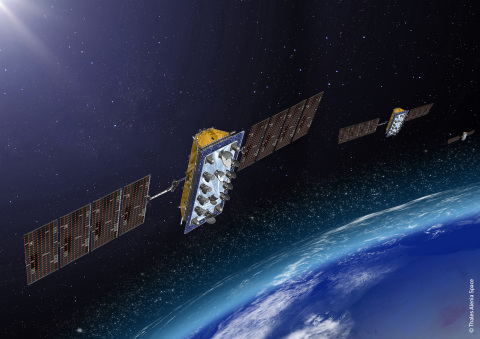LeoSat reageert op verzoek van National Science Foundation om breedbandnetwerk op Antarctica
WASHINGTON–(BUSINESS WIRE)–LeoSat Enterprises, een opkomend bedrijf met plannen voor de lancering van een constellatie met wel 108 communicatiesatellieten in een lage omloopbaan voor het snelste, veiligste en best dekkende datanetwerk ter wereld, heeft vandaag bekendgemaakt dat het door de National Science Foundation (NSF) is ontboden om te reageren op haar verzoek om informatie over de vereisten voor breedbandcommunicatie op de Zuidpool en Antarctica.
Datacommunicatie van en naar poolgebieden is moeilijk en duur. De bouw van kabelnetwerken is uit economisch oogpunt nauwelijks haalbaar en satellietverbindingen vanuit de traditionele, geostationaire baan om de aarde zijn langzaam, duur en operationeel problematisch. Voor bulkdata is er geen levensvatbare oplossing, waardoor gegeven maar al te vaak fysiek naar de eindbestemming worden gebracht. Voor onderzoeksgroepen zorgt dit voor ernstige vertraging en extra kosten.
LeoSat Responds to National Science Foundation RFI for Antarctic Broadband Network
WASHINGTON–(BUSINESS WIRE)– LeoSat Enterprises, an emerging company with plans to launch a constellation of up to 108 low-earth-orbit communications satellites that will provide the fastest, most secure and widest coverage data network in the world, has announced it has been invited by the National Science Foundation (NSF) to respond to their Request for Information (RFI) for broadband data communications requirements in the South Pole and throughout the Antarctic continent.
This Smart News Release features multimedia. View the full release here: http://www.businesswire.com/news/home/20160614005541/en/
 LeoSat Enterprises Satellite Constellation (Phto: Business Wire)
LeoSat Enterprises Satellite Constellation (Phto: Business Wire)Data communication to and from the Polar regions is challenging and expensive. Building cable networks is hardly feasible from an economic perspective and satellite connections using the traditional GEO arc come at low speed, high costs and operational challenges. For bulk data there is no viable solution and all too often the data needs to be physically carried out to its destination. For research communities this causes serious delays and additional costs.
NSF is an independent federal agency that supports fundamental research and education across all fields of science and engineering. Under a Presidential mandate, NSF manages the U.S. Antarctic Program, through which it coordinates all U.S. research on the Southernmost Continent and the surrounding ocean, funds scientists at institutions nationwide to carry out fieldwork and provides the logistical support for that fieldwork.
While the NSF’s two RFIs have been out for some time and suspense dates have passed, NSF has continued its market research information gathering for formulating its plans. Having noted the public announcements by LeoSat, NSF has reached out to LeoSat with a request to respond to the the RFIs to allow LeoSat’s information to be included in NSF’s planning. With the LeoSat network, the satellites will be placed in polar orbits, making the Antarctic region one of the best served regions in the world with fiber-like speeds and low latency.
LeoSat’s CEO, Mark Rigolle, said: “We are excited to be singled out by such a prominent agency as the National Science Foundation. We take that as a strong endorsement of our plans to offer global, low-latency, high-throughput satellite capacity, using a Low Earth Orbit constellation. As indeed our satellites are flown in polar planes, there is good fit with NSF’s requirements. In addition, the large data-transmission requirement, which, as per the two RFI’s is in the terabytes per day, can easily be delivered by the constellation that we plan to launch starting 2019. As such, we hope to work with the NSF in an effort to solve their bandwidth requirements in this challenging part of the world”.
When fully operational, LeosSat will provide point-to-point data connections to and from anywhere on earth without the need for any terrestrial landings or transport. The data will be able to travel in its native form while encrypted and secured from end to end. LeoSat has completed a feasibility study with Thales Alenia Space for its constellation design and deployment and is currently working with them on the next phase of development.
ENDS
About LeoSat Enterprises
LeoSat Enterprises was established in 2013 to leverage the latest developments in satellite communications technologies to develop and launch a new low-earth-orbit satellite constellation which will provide the first commercially available, business grade, extremely high-speed and secure data service worldwide.
With up to 108 low-earth-orbit communications satellites in the constellation LeoSat is the first company to have all of the High Throughput Satellites (HTS) in the constellation connected together in networked HTS satellites, connected to each other and to select established sectors on the planet.
Based in Washington DC, LeoSat is currently working with Thales Alenia Space for the low-earth-orbit constellation of between 78 and 108 Ka-band communications satellites. Once operational, the constellation will provide high-speed, low-latency and highly secure communications and bandwidth for business operations in the telecom backhaul, Oil & Gas exploration, Maritime and international business markets. Launch of the constellation is expected in 2018 or 2019. www.leosat.com
View source version on businesswire.com: http://www.businesswire.com/news/home/20160614005541/en/
Contacts
Melanie Dickie
LeoSat Marketing Communications
Tel: +31 6 14 22 97 62
Email: Melanie.dickie@leosat.com
